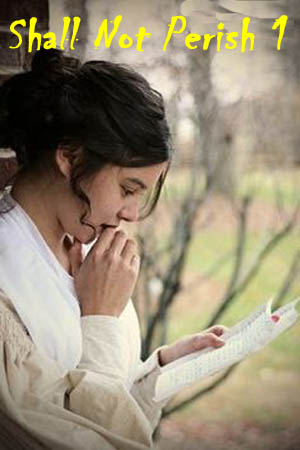Shall Not Perish 1
Shall Not Perish 1


WHEN THE MESSAGE came about Pete, Father and I had already gone to the field. Mother got it out of the mailbox after we left and brought it down to the fence, and she already knew beforehand what it was because she didn't even have on her sunbonnet, so she must have been watching from the kitchen window when the carrier drove up. And I already knew what was in it too. Because she didn't speak.
She just stood at the fence with the little pale envelope that didn't even need a stamp on it in her hand, and it was me that hollered at Father, from further away across the field than he was, so that he reached the fence first where Mother waited even though I was already running. "I know what it is," Mother said. "But can't open it. Open it."
"No it ain't!" I hollered, running. "No it ain't!" Then I was hollering, "No, Pete! No, Pete!" Then I was hollering, "God damn them Japs! God damn them Japs!" and then I was the one Father had to grab and hold, trying to hold me, having to wrestle with me like I was another man instead of just nine.
And that was all. One day there was Pearl Harbour. And the next week Pete went to Memphis, to join the army and go there and help them; and one morning Mother stood at the field fence with a little scrap of paper not even big enough to start a fire with, that didn't even need a stamp on the envelope, saying, A ship was. NOW it is not. Your son was one of them. And we allowed ourselves one day to grieve, and that was all. Because it was April, the hardest middle push of planting time, and there was the land, the seventy acres which were our bread and fire and keep, which had outlasted the Griers before us because they had done right by it, and had outlasted Pete because while he was here he had done his part to help and would outlast Mother and Father and me if we did ours.
Then it happened again. Maybe we had forgotten that it could and was going to, again and again, to people who loved sons and brothers as we loved Pete, until the day finally came when there would be an end to it. After that day when we saw Pete's name and picture in the Memphis paper, Father would bring one home with him each time he went to town.
And we would see the pictures and names of soldiers and sailors from other counties and towns in Mississippi and Arkansas and Tennessee, but there wasn't another from ours, and so after a while it did look like Pete was going to be all.
Then it happened again. It was late July, a Friday. Father had gone to town early on Homer Bookwright's cattle truck and now it was sundown. I had just come up from the field with the light sweep and I had just finished stalling the mule and come out of the barn when Homer's truck stopped at the mailbox and Father got down and came up the lane, with a sack of flour balanced on his shoulder and a package under his arm and the folded newspaper in his hand. And I took one look at the folded paper and then no more. Because I knew it too, even if he always did have one when he came back from town. Because it was bound to happen sooner or later; it would not be just us out of all Yoknapatawpha County who had loved enough to have sole right to grief. So I just met him and took part of the load and turned beside him, and we entered the kitchen together where our cold supper waited on the table and Mother sat in the last of sunset in the open door, her hand and arm strong and steady on the dasher of the churn.
When the message came about Pete, Father never touched her. He didn't touch her now.
He just lowered the flour onto the table and went to the chair and held out the folded paper.
"It's Major de Spain's boy," he said. "In town. The av-aytor. That was home last fall in his officer uniform. He run his air plane into a Japanese battleship and blew it up. So they knew where he was at." And Mother didn't stop the churn for a minute either, because even I could tell that the butter had almost come. Then she got up and went to the sink and washed her hands and came back and sat down again.
"Read it," she said.
TO BE CONTD...

























































